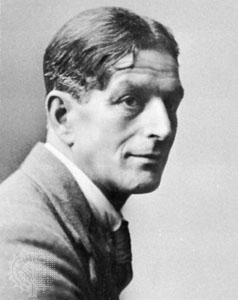
photo © Bryce Gandy, 2010
by Mike Smith
A.E.Coppard‘s ‘My Hundredth Tale’ is one of the ten tales in Nexey’s Harlequin, his seventh collection. Told in the first person, it purports to be the auto-biography of John Flyn. This character is seen by many, including, I suspect, Coppard himself, as the literary alter-ego of the author. Many writers have such doppelgangers: James Joyce has his Stephen Daedalus. Ernest Hemingway has his Nick Adams. Charles Dickens has David Copperfield.
These characters are not merely authorial mouthpieces, like Philip Roth’s Nathan Zuckermann, convenient devices for narrating a story. Indeed, in Joyce’s case, the character does no narrating at all, but is observed by an unseen author – the one that has refined himself out of existence – observed from the inside as well as the out. Alter-egos are different. Johnny Flyn is much more closely bound to his maker, I suspect, than even is Zuckermann.
 Many of the events in Flyn’s life are modelled upon Coppard’s own. Johnny lives in poverty. His father, a tailor, dies young and his mother brings up her family single handed. Like Coppard, Johnny becomes a runner, and goes to live in a cottage in the woods – perhaps the most famous thing that Coppard did, apart from writing stories. Oh, yes, and Johnny writes too, although unlike Coppard, he is a novelist.
Many of the events in Flyn’s life are modelled upon Coppard’s own. Johnny lives in poverty. His father, a tailor, dies young and his mother brings up her family single handed. Like Coppard, Johnny becomes a runner, and goes to live in a cottage in the woods – perhaps the most famous thing that Coppard did, apart from writing stories. Oh, yes, and Johnny writes too, although unlike Coppard, he is a novelist.
‘My Hundredth Tale’ seems more like a novel than a short story. It’s long and episodic, that quality being emphasised by its being given numbered segments. What makes this rambling story so readable is the insights we are given into Johnny’s behaviour, into the processes of gaining self-awareness, into the way that relationships develop and founder. These insights strike at our own complacencies and sensitivities. Most of us have done, said, or felt the painful things in this story.
And so I fell in love with other girls, one after another, or with some together – it is so easy; fancy turns you round and about like a cock on a church.
It was reading about the writer George Moore that first made me stop and think about the autobiographical in fiction in relation to my own work. I think I’d got hold of the idea that it was somehow second rate – uncreative – to use one’s own life as the basis for story. Moore plundered his own life and the lives of those about him in the creation of his fictions, mixing and matching these biographical episodes from tale to tale: lifting short stories from the text of novels, and incorporating previously published shorts into longer pieces. This was a revelation to me. We use past experiences to explore new ideas, and feelings. We twist, turn and transpose what we have been, into what our characters might become. In this way truths are caught in the net of lies that we call fiction.
The title, ‘My Hundredth Tale’, is itself a curiosity, drawing attention, to the author, rather than the content of the tale. The number has a significance that is only relevant to the author. Who else is counting? Who else would think that way-marker worth noting? Among the few critical discussions available on Coppard, I’ve come across the assertion that when he first published, in 1919, he already had a ‘shed full’ of stories. It seems likely that they wouldn’t have been published in the order they were written. Was it his hundredth tale written, I wonder, or the hundredth published, and which of those two markers should we take as being the genuine waymark of a writer’s journey?
 Johnny Flyn’s autobiography is a soul searching affair, in which self-doubt, even self-loathing, seem to trump the nuggets of self-awareness that the story throws up. Beginning with the narrator’s relationship with his parents, it passes through a rivalry with a contemporary male friend, into a period of promiscuity, and on to several relationships, all of which founder for reasons of pride and personal, rather than class, snobbery.
Johnny Flyn’s autobiography is a soul searching affair, in which self-doubt, even self-loathing, seem to trump the nuggets of self-awareness that the story throws up. Beginning with the narrator’s relationship with his parents, it passes through a rivalry with a contemporary male friend, into a period of promiscuity, and on to several relationships, all of which founder for reasons of pride and personal, rather than class, snobbery.
Only in the things I could write was I ever alive or sincere; elsewhere in the world I was but a hollow reed echoing the wind’s will, never my own.
In the voice of Johnny, Coppard identifies the loveless, detached life of the writer, falsifying and replicating the emotions he perceives in others, yet failing to experience them fully himself – a failure that he knows and understands only too well, but which he cannot correct, despite his epiphanies. Some of those epiphanies emerge in pithy one-liners:
A book like this, full of half-truths – truths as I see them, the other halves hidden from me yet so very plain to you.
…I was a mere sponge that sucked up other people’s tears and squeezed them out as my own…
This is the soul searching not merely of a person, but of a person who is a writer, and, early on in the story, he has been told the secret of what being a successful writer is: “To write, and write authoritatively, about nothing.”
In Coppard’s autobiography, It’s Me, O Lord, he writes about the fictionalising of his life story, but what struck me, reading ‘My Hundredth Tale’, were the truths about writing, about living in poverty, and about relationships that could not be revealed in a factual account without seeming, well, rather self-indulgent, and perhaps even false. ‘I suppose I have lied about myself, even here, about my real character – it is difficult to know.’
If this tale was indeed the hundredth written, or it was, as seems more likely, given that title to add the significance of a milestone to the content, it is poignant that it should appear in the collection that many see as marking the turning point in Coppard’s canon. The collection Nexey’s Harlequin, its gaudy covers hidden by a discreetly plain dust jacket, was published in 1931, a dozen years after his first. The following six collections were spread over sixteen years, a period that most commentators have seen as a decline.
~
Mike Smith writes across a range of genres, including poetry, drama, and literary criticism. Under the name Brindley Hallam Dennis he has published That’s What Ya Get! Kowalski’s Assertions (Unbound Press, 2010), the novella A Penny Spitfire (Pewter Rose 2011), and, in 2012, Talking To Owls (Pewter Rose), a collection of short stories, monologues and flash fictions. In 2009, he received the degree of MLitt from Glasgow University. He currently teaches Creative Writing at Cumbria University. His writing has been published, broadcast and performed, and has won prizes and awards in Scotland and England. He is particularly interested in the structure of short stories, and in the relationship between the story and the narrator. He is keen on the ‘told’ story, and some of his tellings can be found at BHDandMe on Vimeo. He has a collection of essays on short story form due out from Pewter Rose Press, and a collection of short stories from Sentinel Publications. He is a founder/presenter of LitCaff, a monthly evening of fiction (with added poetry) in Carlisle, England. His most recent collection of short stories is The Man Who Found A Barrel Full of Beer, written as Brindley Hallam Dennis. His collection of essays on A. E. Coppard, English of the English, features responses to the tales of A. E. Coppard.

